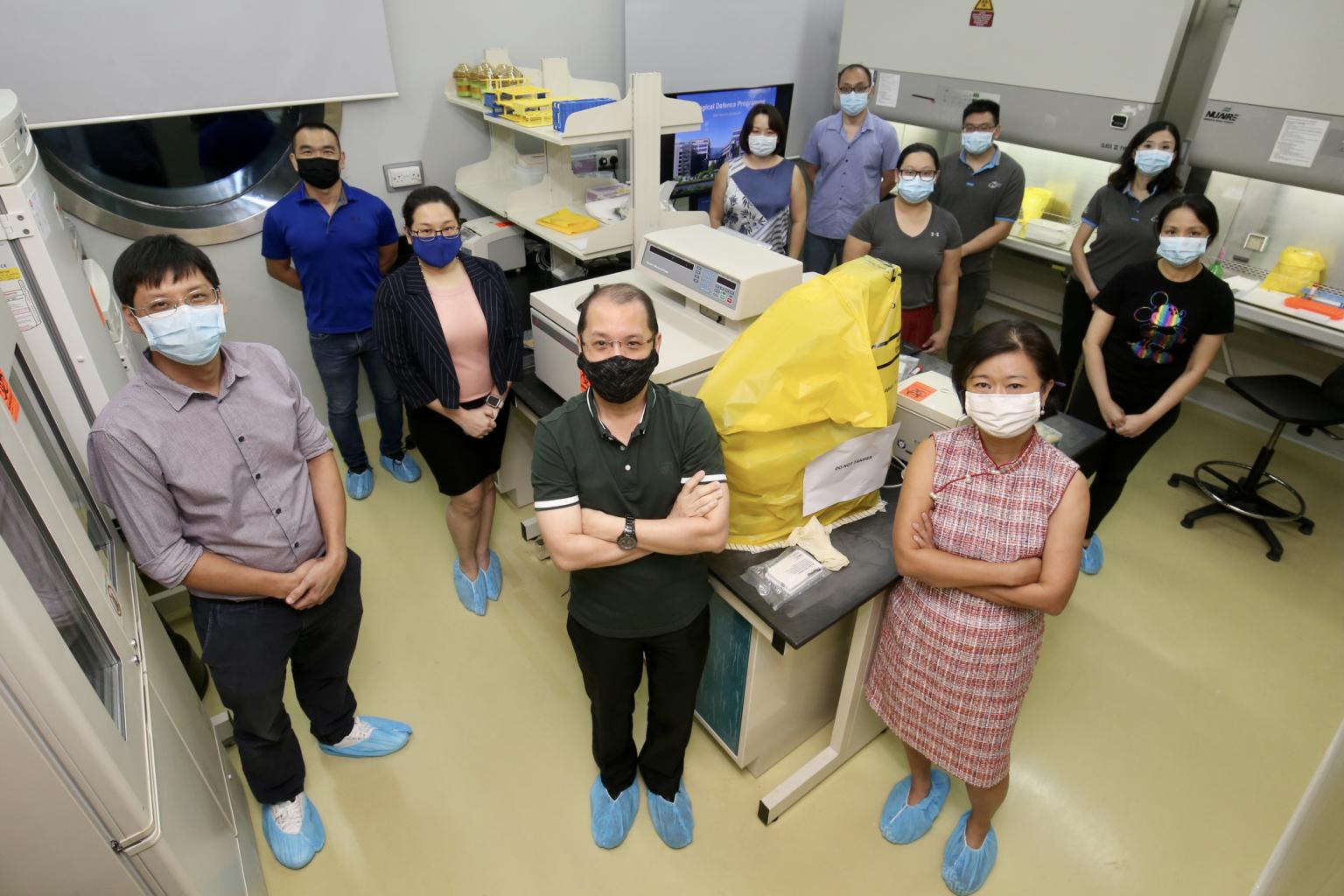DSO biological defence team, which developed Covid-19 test kit, wins Defence Technology Prize
Sign up now: Get ST's newsletters delivered to your inbox

Associate Professor Tan Boon Huan (bottom right) said her team's role in the national Covid-19 efforts was all part of the capabilities built up over the years.
PHOTO: LIANHE ZAOBAO
SINGAPORE - With its mission of keeping the Singapore Armed Forces operationally ready despite the threat of infectious diseases, the biological defence team at DSO National Laboratories kicked into high gear in December last year when Covid-19 emerged in China.
In January, the team embarked on several studies with the National Centre for Infectious Diseases to look into the transmission risks of Covid-19.
Two months later, in March, with possible shortages in the supply of reagents used in test kits, the team developed their own direct polymerase chain reaction (PCR) test which could deliver results quicker and without the need for reagents used in sample processing.
On Friday (Oct 30), DSO's Biological Defence Programme team was awarded the Defence Technology Prize, which is given each year to teams or individuals who have made significant technological contributions to the defence capabilities of Singapore.
In a speech at the prize presentation ceremony, Defence Minister Ng Eng Hen recalled how he was reassured of DSO's capabilities when he had "some flu-like symptoms" in March and went to DSO for both a PCR and antibody test. Both turned out negative.
DSO's early capability to conduct PCR tests for Covid-19 - since January - gave confidence to the SAF because it had to continue its critical operations, he said.
"If there was a suspicion of a case, if you had to depend on other agencies and there was too long a lag time, there was transmission - you risk the whole force being degraded and confidence being lost," he said.
"In April, when our SAF teams and myself had to go down to migrant worker dorms and take care of patients in community care facilities, this capability of DSO gave us the confidence that if we needed to, we could detect early.
"We had access to these tests and that confidence makes a difference in our operations," he said at the ceremony at the Ministry of Defence (Mindef) auditorium.
Dr Ng said that for every potential crisis, he was assured because he knew that there was "a repository of information, know-how and commitment in the staff of DSO, DSTA (Defence Science and Technology Agency), SAF and ST Engineering", who delivered each time in various ways.
But even as the SAF, DSO and DSTA help to deal with the outbreak, their core missions against traditional security threats must continue and not flag, said Dr Ng.
He highlighted the work of the team behind the Cyber Security Operations Centre 2.0 system which is among those that has enabled Mindef and the SAF to maintain "relevance and potency".
Operationalised last year, the system helps to detect and monitor threats to Mindef and the SAF's networks. It was designed with advanced artificial intelligence and machine learning techniques.
Mr Paul Tan Hong Tat, DSTA's director of cyber security, 47, said that before the system was operational, analysing and responding to cyber-security incidents could take hours.
But, with increased automation and a revamped command and control interface, operators respond within minutes or even seconds now, he said.
Mr Tan and the team behind Cyber Security Operations Centre 2.0 were among seven prize winners on Friday. Established in 1989, the prize is meant to encourage breakthroughs in defence science and technology.
DSO's Biological Defence Programme, which was initiated in the late 1990s, builds capabilities in detection, diagnostics, and protection against biological agents.
The team was awarded the team Defence Technology Prize (Research & Development).
Its biosafety level 3 lab is one of the three in Singapore that continue to perform R&D on the live Covid-19 virus.
Speaking with the media on Thursday, director of the programme, Associate Professor Tan Boon Huan, 50, said her team's role in the national Covid-19 efforts was all part of the capabilities built up over the years.
"So when Covid-19 came, we were all very excited because it is almost like a war for the team. Our scientists may be tired after so many months, but the passion they have for their work is still there," she said.


